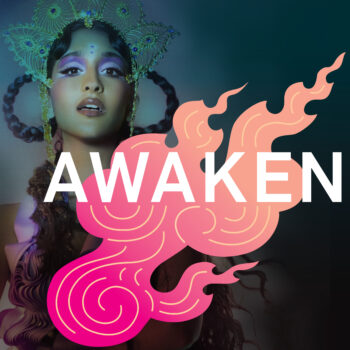
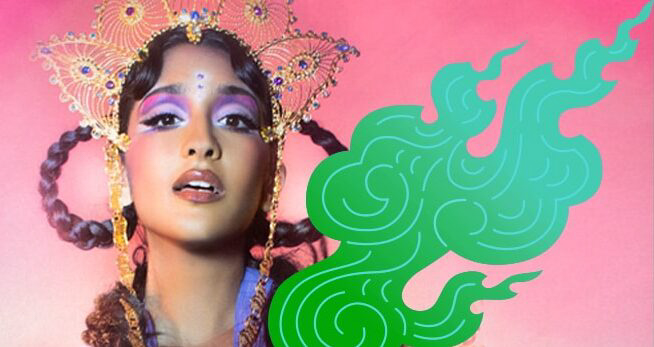
No one wants to admit they are envious, yet in the age of social media, envy is a bitter taste in everyone’s mouth from time to time. But envy dismantled can point you in the right direction and show you your heart’s desire. Can feelings of envy be transformed from an isolating experience to one that actually connects us?
MADAME GANDHI:
I actually think that envy is one of the most useful emotions, because it’s showing you what it is that you actually want for your own life. It’s a very natural, clear, honest, driving factor.
RAVEENA AURORA:
Singer and songwriter Madame Gandhi.
MADAME GANDHI:
And a spiritual lens would add that, you know, it’s vital that we prioritize meeting our own needs, that we prioritize fulfillment, so that we always have something to give. That we can actually be in service of others because we’re energizing and nourishing and fulfilling ourselves. I actually kind of light up when I notice myself feeling envious of somebody else or some thing or a situation, or I have a thought like “I wish I was like that,” because it’s just the new north.
RAVEENA AURORA:
Welcome to AWAKEN, a podcast from the Rubin Museum of Art that uses art to explore the dynamic path to enlightenment and what it means to “wake up.” I’m singer and songwriter Raveena Aurora and I have been learning about the transformative power of art throughout my life.
Since time immemorial, art has been used as a portal to better understand ourselves and the world around us. At the Rubin, a museum dedicated to art from the Himalayas, we believe art can inspire us on a path to AWAKENing. And in this series, we’re using a specific artwork, the mandala, to explore this journey and the emotions that accompany us on the way.
But what is a mandala? A mandala is a guide. People from many cultures and religious traditions around the world use mandalas as maps to navigate their inner lives, including their emotions. Throughout this series, with the guidance of scientists, Buddhist teachers, writers, artists, and activists, we wrestle with five challenging emotions–anger, pride, attachment, envy, and ignorance””to help us take a new perspective on how emotions can influence our day-to-day experiences”¦and what they might be able to teach us if we get curious.
In this episode: envy.
Ten year old Nora Wood is the daughter of AWAKEN’s producer.
NORA WOOD:
My understanding of envy is jealousy.
Let’s say you have a sheet of paper for homework, and you got a 53% out of 100, and your friend sitting next to you got 99. And you may feel envious of her test answers, because you wish you had that.
RAVEENA AURORA:
Madame Gandhi is an electronic music producer and drummer who weaves her passion for advocacy and gender liberation into her music.
MADAME GANDHI
I actually think that envy absolutely can have a dark side to it, if you use your envy for being hurtful to somebody else, because you feel like you wish they had””you know you had what they had.
RAVEENA AURORA:
It’s not just that you wish you had what someone else has but you almost wish they didn’t have it. You feel some sort of injustice there. Even though you know you should be happy for them, you simply can’t because you’re caught up in the story of lack within yourself, and how they are the cause for you feeling that lack. Their accomplishment puts sort of a mirror up to your feelings of inadequacy.
MADAME GANDHI
I think when we feel whole, we’re able to hold space for somebody else’s joy. When we feel depleted, it’s really hard to hold space for somebody else’s joy, let alone their pain.”
RAVEENA AURORA:
Of all the emotions that we’re discussing in this series, envy is steeped in self criticism and it has a kind of hopelessness to it. It’s an emotion that can make you feel so alone in the world. Sharon Salzberg is a Buddhist teacher, cofounder of the Insight Meditation Society, and author of several books including Real Happiness.
SHARON SALZBERG:
Even hearing the word, I think, “Oh, that’s a painful state.” [laughs] I would say envy is a painful state of feeling bereft in some way that somebody has something you don’t have and you want it.
RAVEENA AURORA:
And while envy certainly has its counterbalance”¦
SHARON SALZBERG:
Sympathetic joy which is a state very akin to loving kindness or compassion is the state of actually rejoicing in the happiness of another, rather than seeing someone’s success or good fortune, and falling sway to the voice, that envious voice that so often arises within us that says, “Eww, I would be happier if you had a little bit less going for you.” Like, “You don’t have to lose everything, but if the light could just dim a bit, I’d feel better.”
RAVEENA AURORA:
The ability to get lost in the delusion that someone else’s success is your failure, or feeling that they don’t deserve that success, is all too common. Buddhist practitioners learn to acknowledge the success of others as worthy of joy and appreciation instead of coveting it. They accept it as an opportunity to make changes in their own lives. Transforming this harmful emotion into positive actions contributes to a greater good and to a stronger sense of community.
Another way Buddhists confront feelings of envy is to remember everyone – even the most successful person – is subject to the same suffering as anyone else. Aging, illness, and death afflict us all. This helps dismantle our views that exaggerate attributes in other people.
To begin navigating envy, Let’s start by taking a closer look at what it actually is. Psychologist Tracy Dennis-Tiwary is a professor of psychology and neuroscience, and the director of the emotions regulation lab at Hunter College, CUNY.
TRACY DENNIS-TIWARY:
So envy is this, I think of it as sort of a cloying”¦This kind of consumeristic, this wanting, it’s this sort of emotion”¦that there’s something that I need.
NORA WOOD:
So, let’s say my friend got a””her family moved to a new house that I really liked, and I just stayed in my own house, which is perfectly fine. I’m not being angry about my house. But it’s just then I would feel envious of their new house, because I don’t have a new one.
TRACY DENNIS-TIWARY:
I think, again comes back to this self appraisal like we saw before where there’s a notion that if I have this thing, it will contribute to my self worth and my agency and autonomy and ability to have”¦ And my empowerment to do things in the world. And now, there’s a block such that someone has that thing, or they have it and I want it, or they have a way of getting it that I haven’t figured out how to achieve. And so, what envy drives is much more competitive types of behavior rather than collaborative.
SHARON SALZBERG:
It removes us from the situation of reality, which is that we live in an interdependent world, and it posits a kind of world of us versus them, or it’s a dog-eat-dog world and you shouldn’t help anybody else because they’re not going to help you, and don’t let them get ahead of you because you’re going to lose out.
RAVEENA AURORA:
Dzogchen Ponlop Rinpoche is a leading Buddhist teacher and one of the foremost scholars and meditation masters in the Nyingma and Kagyu schools of Tibetan Buddhism.
DZOGCHEN PONLOP RINPOCHE:
Basically, you know, the jealousy, envy, as I always say, they come from this mindset of competitiveness, this sense of competing with each other all the time.
MADAME GANDHI:
I was raised with a very competitive father and mother, and they were competitive with each other!
MADAME GANDHI:
You know They both went to high school together, they were both head boy and head girl, they were both super A+ stars you know in all the realms””in sports, in leadership, in academics. You know. They’re attractive. Like all the things. They had this beautiful romance. And it really was the thing that potentially you can argue tore them apart in the past couple years when my parents ended up splitting. And I think witnessing that was very devastating but also very important, because I learned this is where competition and where two people who are jealous of each other can really tear each other apart, and in turn end up hurting themselves. And I’ve definitely been in relationships where the thing that makes me attracted to my partner is something that I like that they do that I cannot do.
And instead of me drawing it as inspiration and working on myself, I find myself potentially being negative or competitive towards that other person. And that’s definitely times where I’ve seen my own toxicity play out, and I’ve had to learn my lesson.
DZOGCHEN PONLOP RINPOCHE:
Sometimes we even compete with our own selves. My yesterday’s self, versus tomorrow’s self; you know we are competing. I want to be better than yesterday’s self. [laughs] And things like that. But in short, you can see the competitiveness in our culture is very strong. It’s very strong, especially in America, as we all can see.
TRACY DENNIS-TIWARY:
It’s a natural emotion. It’s one that at least when we listen to, it lets us understand what we value and then evaluate whether it’s a good thing to value. But what it does in a way though, is it short circuits some of our most powerful tools which are tools of social connectedness and social bonding, because envy is a breaker of social connection.
SHARON SALZBERG:
So it creates a world that, first of all, is not true. We live in a world where we are connected, like it or not. And it’s not always pleasant, but it’s always true. And someone else’s gain is not always our loss.
RUTH OZEKI:
I tend to stay away from social media because it stirs up all sorts of aversive emotions and mind states.
RAVEENA AURORA:
Author and Zen Priest, Ruth Ozeki.
RUTH OZEKI:
You know there’s a feeling of being hurt, perhaps, or you know a feeling of being ignored. But it’s not like I want what they have. It seems to me that envy has an acquisitive side to it, and that’s what I don’t really feel.
It doesn’t have that kind of acquisitive flavor to it.
Maybe there’s a bit of FOMO, feeling like, “Oh, I’m not really doing what I’m supposed to be doing. I should be doing more of this or more of that.” But this is more kind of neurotic self-judgment rather than envy of somebody else. I think that’s it. I turn stuff inwards. My aversive afflictions tend to be directed at myself, not directed at others. [Laugh]
TRACY DENNIS-TIWARY:
We humans especially are social animals. We evolved to be in groups. We evolved to capitalize on the help of fellow in group members. And so a lot of what makes us great is our ability to draw on those resources, even to reach out when our own personal resources are weak and bolster ourselves and bootstrap ourselves from others.
And so with an emotion like envy that disrupts those social connections and our ability to capitalize on those social bonds, you know there really are some powerful downsides to that emotion.
DZOGCHEN PONLOP RINPOCHE:
There is this sense of competition happening not only at a larger scale, out there in the world and in our community, but also at homes, with each other, between the siblings, even between the partners. And so that sense of competitiveness is creating lots of jealousy and envy in our mind, and breeding that emotion ends up bringing so much pain and suffering.
RAVEENA AURORA:
And therein lies the most challenging part of envy. It can feel really cruel to resent others for their success and it also causes so much suffering to yourself. It overshadows a lot of our good qualities and separates us from our family, friends and colleagues. Envy even drives away some of our most beloved family members from us.
TRACY DENNIS-TIWARY:
Envy is one of the toughest emotions because we never as a society. I don’t know a single society either that would elevate envy as something to be admired. Envy, it implies a lack of something in you.
SHARON SALZBERG:
Very often, it has nothing to do with us. And we could actually be a little joyful which would be really a very liberated state. And it’s also very detrimental because it’s endless. You know. You can look at somebody walking into the room and think, “Oh, they have a nicer sweater than I do.” Then somebody else comes in and you think, “Oh, I’m fine. This sweater is not nearly as nice as mine.” But there’s always someone else walking in the room.
TRACY DENNIS-TIWARY:
So, there’s a vulnerability to envy. It implies a scarcity mentality.
SHARON SALZBERG:
And so it’s just a continual, ceaseless state of comparison, and not a lot of joy about what we do have. Like maybe we could just enjoy our own sweater, you know [laughs], and not be so consumed with what other people have.
TRACY DENNIS-TIWARY:
It implies this sort of cruelty or ill wishing to others.
DZOGCHEN PONLOP RINPOCHE:
Actually [laughs] envy is actually regarded as a part of anger. There’s a sense of””how do you say it?””aggression there. A sense of aggression, that you cannot accept or that you cannot actually appreciate the qualities, positive qualities, of others, positive qualities of the world.
SHARON SALZBERG:
So that envy is based on a lot of assumptions, things like “happiness is a limited commodity in this world,” and “the more someone else has, the less there’s going to be for me.” Or, “I have nothing, and I will forever, and that person, they have everything, and they will forever.”
So of course there are a lot of problems with that, because nothing is forever. It’s very unlikely this person has absolutely everything. And, it’s also very unlikely that I have absolutely nothing. I may have nothing much I’m paying attention to or appreciating. And that’s what I was referring to that we cease to have any delight in what we have, and everything becomes just lit against the light of someone else’s accomplishment or praise or joy, whatever it might be, and we just feel, as I said before, we feel bereft like we’ve got nothin’ goin’, you know? It also is a state where there’s this very funny conclusion we draw, which is a little hard to describe, but we feel like the praise, the prize, the accolade, was heading right toward me, and you stole it.
RAVEENA AURORA:
Envy. It’s such a tough emotion because while it can be so hard”¦ It’s a very lonely state. It’s a very kind of bitter state. It’s not really pleasant to have envy and be lost in it.
RAVEENA AURORA:
Yet its underbelly is one of vulnerability, of pain. But like all these emotions, when we begin to get inside of them when we find the bravery to do so, there’s so much that can be learned. Emotions have so much to reveal.
TRACY DENNIS-TIWARY:
If we take the stance of, okay, let’s stop being so afraid of envy for a second and let’s be curious, let’s investigate, let’s accept it for a minute. Right? This is where it’s useful, right? To accept it because if we take a step back from it, we take a breath and we say, “Okay, if we really investigate what this envy is about, what can we start to learn?”
RAVEENA AURORA:
We start to learn how to tune into our true north, we learn what is important, and we learn to take action””not in order to be better than others, but with everyone in mind. We learn to collaborate as we accomplish. Again, Ponlop Rinpoche.
DZOGCHEN PONLOP RINPOCHE:
When we transmute that emotion, when you look at its positive side, then””like you know, like anything, there’s pros and cons and positive and negative sides of everything. There’s just a sense of the wisdom that we can gain from this energy, you know, the power or the energy of envy has a lot of, how do you say, strife, or energy has this power to accomplish things, right?
Accomplish things, and collaborate, and to””yes, to bring result, to bring fruit. And so, the flip side of this emotion if you look at its energy, it has this powerful, beautiful, you know, beautiful energy of accomplishing a lot of positive results for one’s self and others.
TRACY DENNIS-TIWARY:
I think we start to learn what we care about. I think we start to learn about what we value in ourselves and what we feel we are maybe lacking or weak in.
MADAME GANDHI:
I think envy can actually be a really, really positive and useful emotion if used with respect and wisdom.
TRACY DENNIS-TIWARY:
And so, that understanding of our sense of less when it comes to ourselves, again that can be an opportunity to say, “Okay. If I can really look at that face-to-face or head on, and if I don’t want it, if I don’t accept that I’m an envious person, if I want that to change, I accept that it’s there, but I don’t accept that I want it to stay that way, then that is where the work is.
SHARON SALZBERG:
I had a book on The New York Times bestseller list, and I have no idea how it got there. And it was also really powerful to see other people’s reaction. You know. And it wasn’t like malevolence, but it was like hurt, you know? Like some people looked actually hurt that it happened for me, and it felt so kind of withering, you know, compared to the people who were actually really delighted, even if they were authors as well. And I’ve had many teachers who talk about that bundle of qualities which is usually referred to as the brahmaviharas or the four boundless states in Buddhism of loving kindness, compassion, sympathetic joy, and equanimity or balance of mind. And I’ve had many teachers say that of those four, sympathetic joy can be the most difficult. But not impossible.
MADAME GANDHI:
It’s like, “Uch. Thank you for showing me what’s possible. Thank you for showing me something that I didn’t know was accessible to me, but by you doing it and stepping into your power, you showed me that I too can do it, I too can step into my power. How exciting. How wonderful. You lit up something in me. Thank you.” You can actually shift it into a moment of gratitude.
SHARON SALZBERG:
There are many paths. You know, like gratitude is absolutely one. Remembering the truth of change is another. Compassion is one, because there’s nobody who has it all. We just get into this sort of imaginary world of like, “Their life is perfect,” and it’s just not so. And remembering the fragility of life and its ever changing nature. And the truth of change.
RAVEENA AURORA:
The emotions that can be most challenging to look at can also be the ones that lead to the greatest growth. But we have to do that work, we have to take the time to investigate. Which can be hard to do.
TRACY DENNIS-TIWARY:
Until we can really take that hard look, like who wants to look in and look at their envious, you know, those envious feelings?
MADAME GANDHI:
It felt like shame. It felt like shame. It felt like, wow, this is something that’s so easy for others; it’s very challenging for myself.
TRACY DENNIS-TIWARY:
It’s just so”¦I mean, it just feels then you have to layer shame on top of it, right, because you know it’s nothing we’re proud about.
MADAME GANDHI:
When I have resistance within my body or towards something, or when I feel like, mmm, I want to do this but I’m not, like I’m limiting myself, I pay attention to that”¦Because on the other side of fear is where the bliss lives, is where the happiness lives, is where the high vibrations are, and where the love lives.
SHARON SALZBERG:
So compassion is a doorway. Mindfulness is certainly a doorway because feeling something is one thing, and investing in it and taking it to heart and nurturing it is quite a different thing. One of my beliefs, one of my maxims is, “We feel what we feel.” You have to allow every feeling the dignity of its own existence. You can’t just denounce, you know, your fear and your envy and all of that. It’s there, and it’s conditioned, it’s habituated, and it will arise. But what we then do with it is the entire question. So rather than blaming yourself and feeling like a failure and hating yourself and feeling ashamed, you don’t need to get into all that.
But, recognize what you’re feeling. As I said earlier, it’s a painful feeling. Rather than calling it bad or wrong or terrible or miserable, it’s like so painful, to get lost in it, that we develop a different relationship to it. Even remind ourselves of what we actually do know. Like, would I be happy if this person only suffered and I could watch them like be more and more and more miserable? And you think, well, maybe, but probably not, you know? [laughs] Because that’s really not in our makeup, you know, generally speaking. And so we can recognize the emotion without being down on ourselves about it, and also reminding ourselves, “I don’t really want to get lost there. You know. I’ve been there. I think I’ll let go and move on.”
RAVEENA AURORA:
Like all of these emotions we are discussing, and as the mandala illustrates, it’s not about rejecting the feeling, it’s about facing it head on. In the Rubin Museum’s interactive installation, the Mandala Lab, we’re invited to play, experiment, and learn to harness the power of difficult emotions and transform them into wisdom.
Picture a giant golden orb, pulsating like a lighthouse, beckoning you to breathe in and breathe out. You will find such an orb set into the wall in the Mandala Lab, and cushions on the floor just below, inviting you to sit. Wherever you are now, take a seat if you can. And take three very slow breaths along with me and the glowing sculpture”¦
Inhale”¦
[inhale, exhale (10-second cycle)
Music/sound design accompanies us
inhale, exhale
Inhale, exhale]
Good.
Maybe you notice something has changed. When we simply breathe together in unison, we actually connect in a subliminal way as one body. Scientists call it “entrainment.” Mothers call it bonding. Musicians call it music. Whatever you call it, envy turns to connection, and a sense of collective accomplishment arises.
SHARON SALZBERG:
It’s not a question of whether we feel envy, but whether we’re kind of governed by it, in making choices, in how we relate to others, and so on. So if it’s that much infusing us or it’s that overwhelming to us, so that it’s really guiding us in some way, then of course, then we don’t feel we live in an interconnected universe; we feel someone else’s accomplishment just takes something away from us, and we’re on our own, and we get more and more and more alone.
MADAME GANDHI:
You want to shine? Please go and shine. Just because I’m shining doesn’t mean you can’t also shine. In fact, you must shine. The world needs you to shine.
SHARON SALZBERG:
And the hardest thing for me, in assessing that state, is that it’s so untrue, you know? It’s like we can’t make the world over into this endless competition as much as we try, because it’s disaster. The truth is that we’re interdependent, and we’re counting on others, and others are counting on us. That’s how the world actually looks. So if you want to be the singular success in the universe, first of all, it sounds tiring, but it’s also””it’s never like that.
TRACY DENNIS-TIWARY:
So, I think it’s, again, it takes courage to look at envy, to listen to it as information, to see where we feel the lack, and then there could be other ways that we could start to build ourself up without being grasping towards what someone else has.
RAVEENA AURORA:
The desire to want what someone else has is so primal. A baby will wail if another baby has something they want, and when we’re trying to better understand ourselves, and who we are in the world, we invariably compare ourselves to others. Thankfully it’s something we can grow out of and see our value in our differences.
SHARON SALZBERG:
I would say when I was younger and certainly a lot younger, you know, when I was a child and growing up, it was such a strong force in my mind.
It was true also, like my family didn’t look like other people’s families. It didn’t look like the way I thought a family should look. But I projected like utter perfection on everyone else. Like, “They’ve got no problems whatsoever.” You know. And of course that wasn’t true, either. I would say that it was really compassion and some insight into the fact that everyone really has struggles of one kind or another, that let me let go of that, it was not that I had nothing, I had no resource. I didn’t have a kind of conventional family, but I also ended up in India at the age of 18 learning how to meditate, you know, and a lot, a lot to be grateful for at the same time.
TRACY DENNIS-TIWARY:
I think it is no coincidence that across religious traditions, whether it’s in the 10 commandments or in religious teachings and Buddhism or Hinduism, there’s our cultural practices around envy. We know it’s a really hot button important emotion. So, from a double-edged sword perspective, all the more reason to pay attention and to try to work with it.
SHARON SALZBERG:
It’s not so much we move away from envy; we move away from acting on envy, because I’m so accustomed to people blaming themselves for what they’re feeling, and feeling ashamed in a way that we can’t control. We just can’t. You can’t successfully say, “Well, I’ve thought about it really carefully, and I’m never going to be afraid again.” Or””you know. As we say, when conditions come together for something to arise, it will arise. We can definitely affect the conditions. You know like maybe we realize, “Oh, when I don’t sleep well at night, I get really subject to intense waves of painful feelings that confuse me about where happiness really lies.” And so we can work to affect those conditions, but we can’t absolutely control them, to insist, “I will never be envious again.” You know. So, just to avoid that, I’ll reframe the question.
We don’t want it to govern our lives, because it’s a very lonely picture it paints, and a very alienated one. It doesn’t have to be that way. And so, being able to see the emotion quickly, find that balance place, which is also equanimity, where you’re not like hurtling into it, just overcome by it, and you’re also not pushing against it and hating yourself for feeling it. So in that place, in that particular relationship which is also mindfulness””that’s one way of defining mindfulness””there’s some space. There’s spaciousness. And in that space, we may feel different options arise. We may find creativity arising. Maybe we understand that my success also depends on this person doing well. And so, the more we look, the more we see the truth of interdependence, and the more we don’t want to be governed by a state like envy, which is in defiance of that.
MADAME GANDHI:
We know that abundance is available to everybody, that you do not need to be jealous of me, I do not need to be jealous of you, we need to step into our own power, and everybody needs to shine. That’s the real truth
RAVEENA AURORA:
Thank you for listening to Season 2 of AWAKEN, a podcast from the Rubin Museum that explores the dynamic path to enlightenment and what it means to “wake up.” I’m singer and songwriter Raveena Aurora.
You just heard singer, songwriter and activist Madame Gandhi, Buddhist teacher and academic Dzogchen Ponlop Rinpoche, psychologist and neuroscientist Tracy Dennis-Tiwary, author and Zen priest Ruth Ozeki, author and teacher Sharon Salzberg, and student Nora Wood.
AWAKEN is produced by the Rubin Museum of Art in collaboration with SOUND MADE PUBLIC.
Music is produced by Alexis Cuadrado and Hannis Brown with some additional tracks from Blue Dot sessions.
AWAKEN Season 2 is part of the Rubin Museum’s Mandala Lab multiyear initiative generously supported by 28 donors and sponsors.
You can continue the conversation by following us on Instagram at @rubinmuseum. And if you’re enjoying this podcast, leave us a review wherever you listen to podcasts, and tell your friends about the conversation you just heard.
This is episode 4 of a 7 part series inspired by the Mandala Lab at the Rubin Museum ““ an immersive space for social, emotional, and ethical learning. Come explore the Lab in New York City, or in one of the installations that is traveling the world. Visit rubinmuseum.org to learn more about the Museum and about the art, cultures, and ideas of Himalayan regions. We look forward to seeing you.
AWAKEN Season 2 is hosted by singer and songwriter Raveena Aurora. Guests featured in this episode include psychologist and neuroscientist Tracy Dennis-Tiwary, artist and activist Madame Gandhi, Buddhist teacher and scholar Dzogchen Ponlop Rinpoche, Buddhist teacher and author Sharon Salzberg, and student Nora Wood. Read more about these guests below.
View the Vairochana Mandala which inspired this season of AWAKEN and the Rubin’s Mandala Lab below.
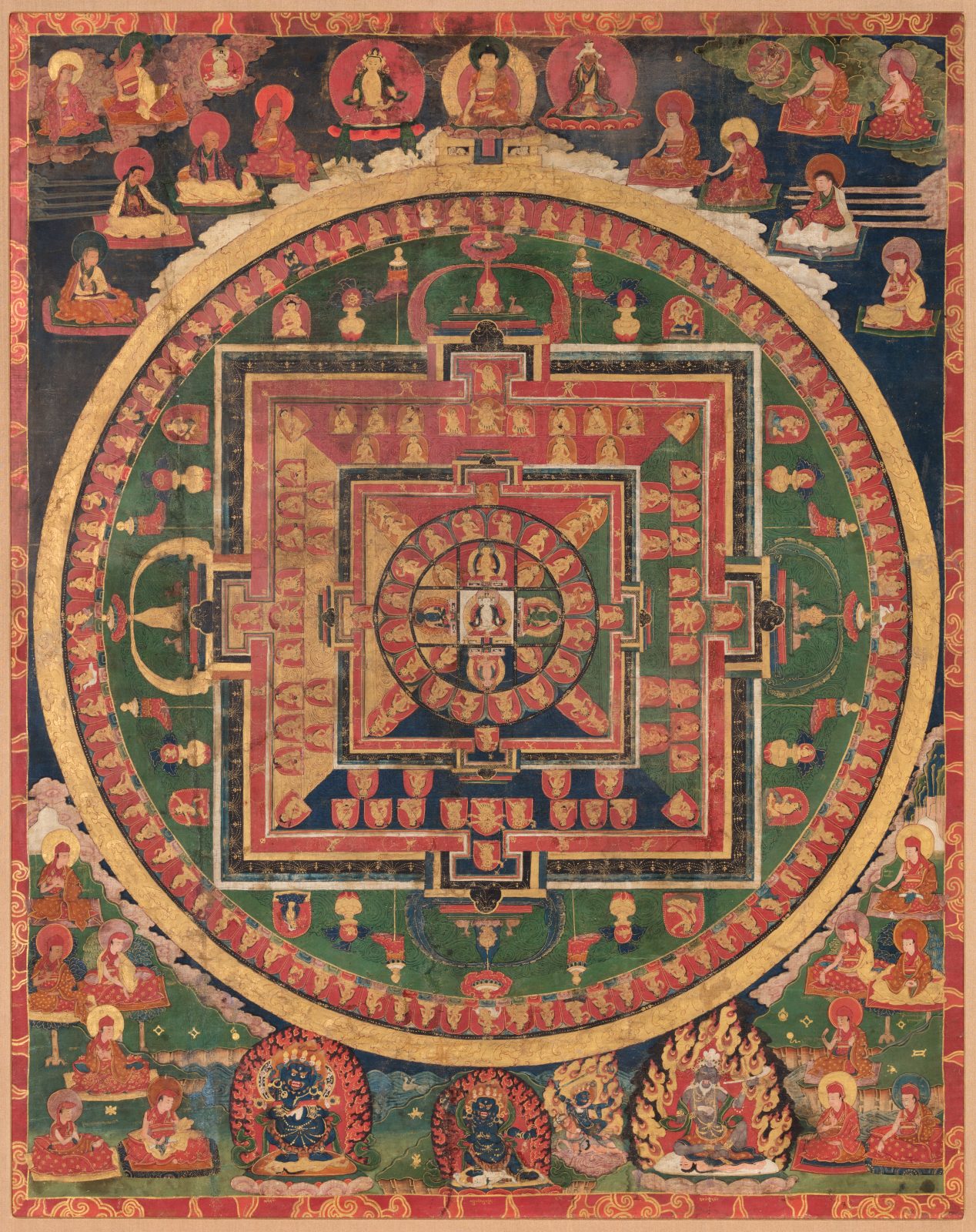
Sarvavid Vairochana Mandala; Tibet; 17th century; Pigments on cloth; Rubin Museum of Himalayan Art, Gift of Shelley and Donald Rubin; C2006.66.346

For Raveena, music is meant to be a “complete expression of the self.” It’s a truth she’s leaned on through a whirlwind couple of years, which saw a potent flurry of output and a pointed ascent into the conversation with her critically acclaimed 2019 debut full-length, Lucid, and 2020 follow-up, Moonstone EP. Asha’s Awakening takes listeners on an epic deep dive into Indian culture. An homage to her heritage as a first-generation descendant of genocide survivors and Reiki healers, the album incorporates influences from Bollywood and celebrated Indian artists like R.D. Burman and Asha Bhosle, as well as Western music—specifically R&B, rock, and soul—and melds the genres prevalent throughout Raveena’s catalog into one cohesive body of work. The album also marries eras in time, fusing together a contemporary take on sounds influenced by Alice Coltrane and Asha Puthli from the 60s and 70s with those of Timbaland, Missy Elliott, M.I.A., and Jai Paul from the early 2000s. It is a labor of love that represents her evolution as an artist. Raveena remarks, “I think it’s really fun putting people in uncomfortable positions to receive new sides of you. The human experience is so vast.”
Inspired by artists like Sade, Corinne Bailey Rae, Minnie Riperton, and Indian singer Asha Puthli, Raveena is a highly creative, dynamic, and spiritual artist who aims to build fully realized worlds within each of her projects: conceptual experimentations in sound, threaded together by stories of healing and self-realization meant to be experienced from start to finish.

Tracy A. Dennis-Tiwary, PhD, is a professor of psychology and neuroscience at The City University of New York. As director of the Emotion Regulation Lab, she conducts NIH-funded research on anxiety, suicide, and digital therapeutics for stress and anxiety. She is the cofounder of Arcade Therapeutics, which translates cutting-edge science into digital tools for behavioral health, and co-executive director of the Center for Health Technology at Hunter College. She is the author of Future Tense: Making Anxiety Our Superpower.

Madame Gandhi is an award-winning artist and activist known for her uplifting, percussive electronic music and positive message about gender liberation and personal power. She began producing music in 2015, after her story running the London Marathon free-bleeding to combat menstrual stigma went viral around the world. She has been listed as Forbes 30 Under 30 in Music, and her 2020 TED Talk about conscious music consumption has been viewed over a million times. Waiting For Me, shot in Mumbai, India, won the Music Video Jury Award at SXSW Film Festival in 2021, and her 100% Organically Sourced x Sound MANA nature sound pack won the New.Wav award at the 2021 Splice Awards. Her third studio album, Vibrations, is slated for release in 2022, following the release of her previous albums Voices (2016) and Visions (2019). Gandhi completed a Masters in Music Science & Technology at Stanford University’s CCRMA where she spent time in Antarctica sampling the sounds of glaciers melting to create empathy and awareness around climate change.
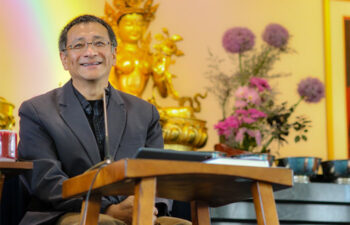
Dzogchen Ponlop Rinpoche is a widely celebrated Buddhist teacher and the author of Emotional Rescue, Rebel Buddha, and other books. A lover of music, art and urban culture, Rinpoche is a poet, photographer, accomplished calligrapher and visual artist, as well as a prolific author. Rinpoche is the founder, president, and spiritual director of Nalandabodhi, an international community of Buddhist centers. Rinpoche is acknowledged as one of the foremost scholars and meditation masters of his generation in the Nyingma and Kagyu schools of Tibetan Buddhism. He is known for his sharp intellect, humor, and easygoing teaching style, for launching the kindness initiative #GoKind and for his outreach to communities internationally.
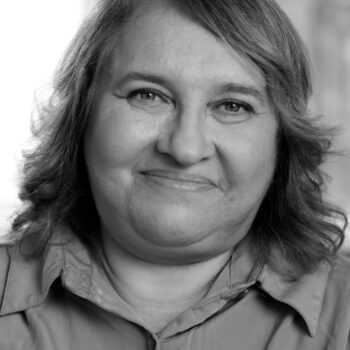
Sharon Salzberg, Cofounder of the Insight Meditation Society in Barre, Massachusetts, has guided meditation retreats worldwide since 1974. Her latest books are Real Life: The Journey from Isolation to Openness and Freedom and Finding Your Way: Meditations, Thoughts, and Wisdom for Living an Authentic Life. She is a weekly columnist for On Being, a regular contributor to the Huffington Post, and the author of several other books, including the New York Times bestseller Real Happiness: The Power of Meditation, Real Change: Mindfulness to Heal Ourselves and the World, Faith: Trusting Your Own Deepest Experience, and Lovingkindness: The Revolutionary Art of Happiness. Ms. Salzberg has been a regular participant in the Rubin’s many on-stage conversations and regards the Rubin as a supplemental office.

Nora is a ten-year-old student and the daughter of the producer of AWAKEN.
Get the latest news and stories from the Rubin, plus occasional information on how to support our work.